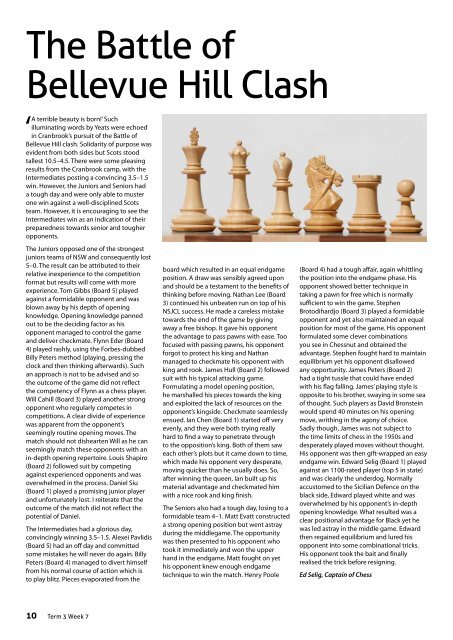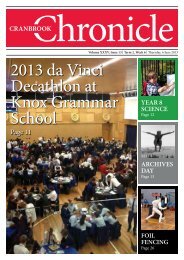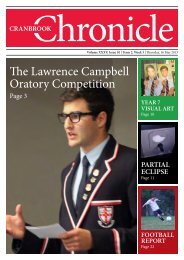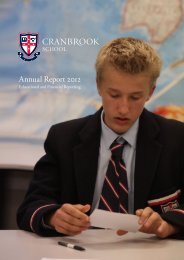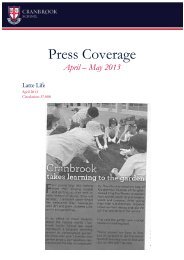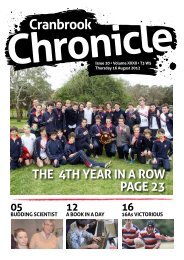Advertisements - Cranbrook School
Advertisements - Cranbrook School
Advertisements - Cranbrook School
You also want an ePaper? Increase the reach of your titles
YUMPU automatically turns print PDFs into web optimized ePapers that Google loves.
The Battle of<br />
Bellevue Hill Clash<br />
‘A terrible beauty is born!’ Such<br />
illuminating words by Yeats were echoed<br />
in <strong>Cranbrook</strong>’s pursuit of the Battle of<br />
Bellevue Hill clash. Solidarity of purpose was<br />
evident from both sides but Scots stood<br />
tallest 10.5–4.5. There were some pleasing<br />
results from the <strong>Cranbrook</strong> camp, with the<br />
Intermediates posting a convincing 3.5–1.5<br />
win. However, the Juniors and Seniors had<br />
a tough day and were only able to muster<br />
one win against a well-disciplined Scots<br />
team. However, it is encouraging to see the<br />
Intermediates win as an indication of their<br />
preparedness towards senior and tougher<br />
opponents.<br />
The Juniors opposed one of the strongest<br />
juniors teams of NSW and consequently lost<br />
5–0. The result can be attributed to their<br />
relative inexperience to the competition<br />
format but results will come with more<br />
experience. Tom Gibbs (Board 5) played<br />
against a formidable opponent and was<br />
blown away by his depth of opening<br />
knowledge. Opening knowledge panned<br />
out to be the deciding factor as his<br />
opponent managed to control the game<br />
and deliver checkmate. flynn eder (Board<br />
4) played rashly, using the forbes-dubbed<br />
Billy Peters method (playing, pressing the<br />
clock and then thinking afterwards). Such<br />
an approach is not to be advised and so<br />
the outcome of the game did not reflect<br />
the competency of flynn as a chess player.<br />
Will Cahill (Board 3) played another strong<br />
opponent who regularly competes in<br />
competitions. A clear divide of experience<br />
was apparent from the opponent’s<br />
seemingly routine opening moves. The<br />
match should not dishearten Will as he can<br />
seemingly match these opponents with an<br />
in-depth opening repertoire. louis Shapiro<br />
(Board 2) followed suit by competing<br />
against experienced opponents and was<br />
overwhelmed in the process. Daniel Siu<br />
(Board 1) played a promising junior player<br />
and unfortunately lost. I reiterate that the<br />
outcome of the match did not reflect the<br />
potential of Daniel.<br />
The Intermediates had a glorious day,<br />
convincingly winning 3.5–1.5. Alexei Pavlidis<br />
(Board 5) had an off day and committed<br />
some mistakes he will never do again. Billy<br />
Peters (Board 4) managed to divert himself<br />
from his normal course of action which is<br />
to play blitz. Pieces evaporated from the<br />
10 Term 3 Week 7<br />
board which resulted in an equal endgame<br />
position. A draw was sensibly agreed upon<br />
and should be a testament to the benefits of<br />
thinking before moving. Nathan lee (Board<br />
3) continued his unbeaten run on top of his<br />
NSJCl success. He made a careless mistake<br />
towards the end of the game by giving<br />
away a free bishop. It gave his opponent<br />
the advantage to pass pawns with ease. Too<br />
focused with passing pawns, his opponent<br />
forgot to protect his king and Nathan<br />
managed to checkmate his opponent with<br />
king and rook. James Hull (Board 2) followed<br />
suit with his typical attacking game.<br />
formulating a model opening position,<br />
he marshalled his pieces towards the king<br />
and exploited the lack of resources on the<br />
opponent’s kingside. Checkmate seamlessly<br />
ensued. Ian Chen (Board 1) started off very<br />
evenly, and they were both trying really<br />
hard to find a way to penetrate through<br />
to the opposition’s king. Both of them saw<br />
each other’s plots but it came down to time,<br />
which made his opponent very desperate,<br />
moving quicker than he usually does. So,<br />
after winning the queen, Ian built up his<br />
material advantage and checkmated him<br />
with a nice rook and king finish.<br />
The Seniors also had a tough day, losing to a<br />
formidable team 4–1. matt evatt constructed<br />
a strong opening position but went astray<br />
during the middlegame. The opportunity<br />
was then presented to his opponent who<br />
took it immediately and won the upper<br />
hand in the endgame. matt fought on yet<br />
his opponent knew enough endgame<br />
technique to win the match. Henry Poole<br />
(Board 4) had a tough affair, again whittling<br />
the position into the endgame phase. His<br />
opponent showed better technique in<br />
taking a pawn for free which is normally<br />
sufficient to win the game. Stephen<br />
Brotodihardjo (Board 3) played a formidable<br />
opponent and yet also maintained an equal<br />
position for most of the game. His opponent<br />
formulated some clever combinations<br />
you see in Chessnut and obtained the<br />
advantage. Stephen fought hard to maintain<br />
equilibrium yet his opponent disallowed<br />
any opportunity. James Peters (Board 2)<br />
had a tight tussle that could have ended<br />
with his flag falling. James’ playing style is<br />
opposite to his brother, swaying in some sea<br />
of thought. Such players as David Bronstein<br />
would spend 40 minutes on his opening<br />
move, writhing in the agony of choice.<br />
Sadly though, James was not subject to<br />
the time limits of chess in the 1950s and<br />
desperately played moves without thought.<br />
His opponent was then gift-wrapped an easy<br />
endgame win. edward Selig (Board 1) played<br />
against an 1100-rated player (top 5 in state)<br />
and was clearly the underdog. Normally<br />
accustomed to the Sicilian Defence on the<br />
black side, edward played white and was<br />
overwhelmed by his opponent’s in-depth<br />
opening knowledge. What resulted was a<br />
clear positional advantage for Black yet he<br />
was led astray in the middle game. edward<br />
then regained equilibrium and lured his<br />
opponent into some combinational tricks.<br />
His opponent took the bait and finally<br />
realised the trick before resigning.<br />
Ed Selig, Captain of Chess


